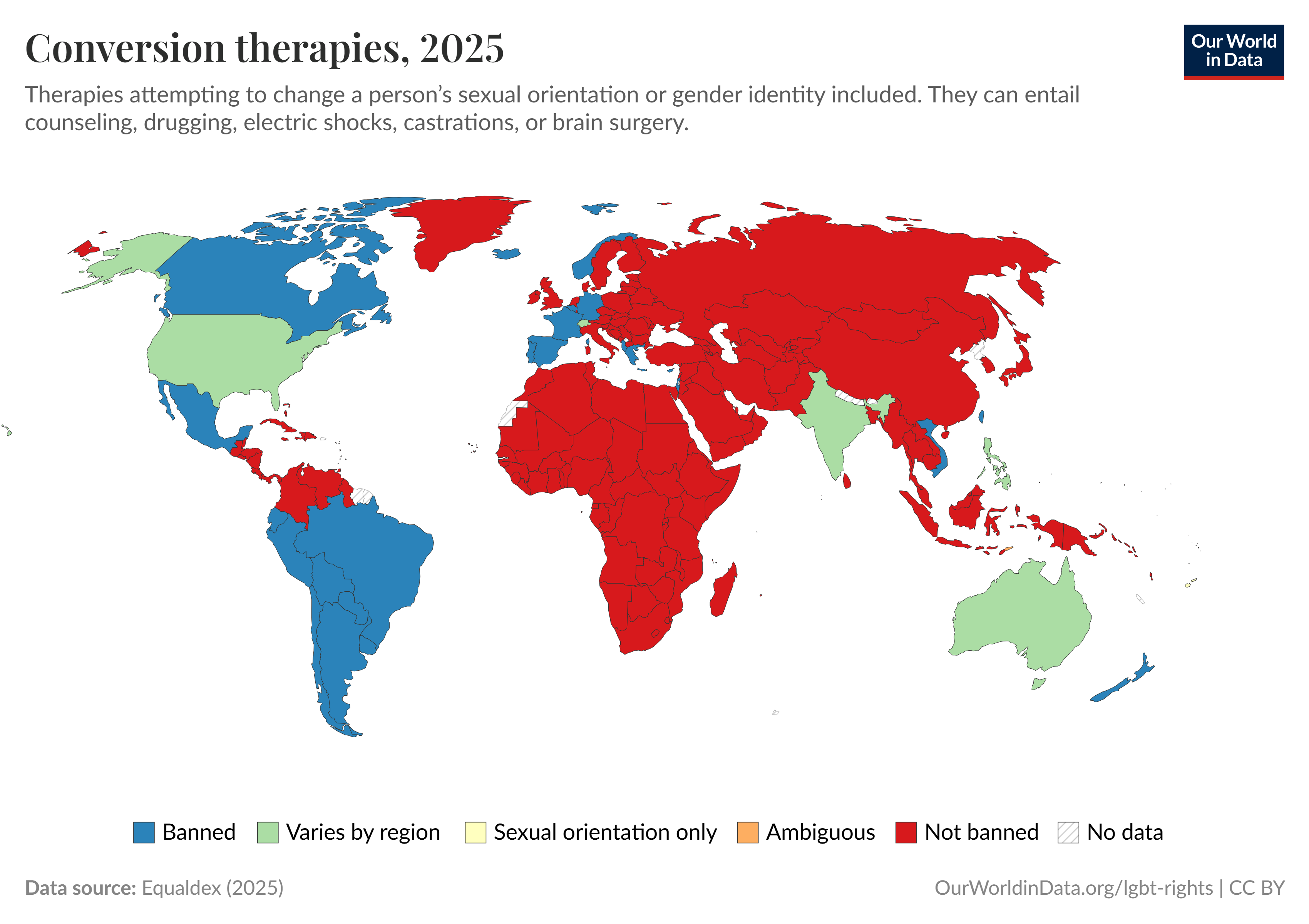Map of Conversion Therapy Legal Status Worldwide 2025


Alex Cartwright
Senior Cartographer & GIS Specialist
Alex Cartwright is a renowned cartographer and geographic information systems specialist with over 15 years of experience in spatial analysis and data...
Geographic Analysis
What This Map Shows
The map titled "Conversion Therapies: The Legal Status of Conducting Sexual Orientation Changing Therapy, 2025" provides a comprehensive overview of the legal landscape surrounding conversion therapy across different countries. It visually represents which nations have banned these practices, which allow them, and those that remain ambiguous in their legal stance. Conversion therapy, often referred to as sexual orientation change efforts (SOCE), encompasses a range of practices aimed at changing an individual's sexual orientation from LGBTQ+ to heterosexual. This map serves as a vital tool for understanding the global commitment to LGBTQ+ rights and the ongoing debates surrounding this controversial practice.
Transitioning from the visual representation, it's essential to delve into the topic of conversion therapy itself. This practice has been widely discredited by major medical and psychological organizations, including the American Psychological Association and the World Health Organization. Despite this, conversion therapy remains legal in numerous countries, raising significant ethical and human rights concerns.
Deep Dive into Conversion Therapy
Conversion therapy has a long and troubling history, often rooted in societal norms that view heterosexuality as the only acceptable orientation. The methods employed in these practices are varied, ranging from talk therapy to more extreme measures such as aversive conditioning. Interestingly, many of these practices are based on outdated and debunked theories of sexuality.
As of 2025, the legal status of conversion therapy varies dramatically across the globe. In some regions, such as much of Western Europe and parts of North America, there is a strong movement toward banning these practices, driven by advocacy from LGBTQ+ groups and increasing public awareness of the harm caused by conversion therapy. For instance, countries like Canada and Germany have instituted comprehensive bans, recognizing the psychological and emotional damage these therapies can inflict.
However, in contrast, several areas, particularly in parts of Africa and the Middle East, continue to endorse conversion therapy. Countries like Uganda and Nigeria have laws that not only allow but sometimes promote these practices, often justified by cultural or religious beliefs. The experiences of individuals subjected to these therapies can be devastating, leading to lasting trauma, depression, and even suicidal ideation.
What's fascinating is the growing body of research indicating that conversion therapy does not change an individual's sexual orientation. Instead, it often exacerbates feelings of shame and isolation among LGBTQ+ individuals. This has prompted a strong backlash from both the medical community and human rights advocates, who argue for the rights of individuals to embrace their identity without fear of coercion or harmful interventions.
Regional Analysis
Examining the legal status of conversion therapy across different regions reveals stark contrasts. In North America, the United States has seen a patchwork of state laws, with some states like California and New York enacting bans, while others have no restrictions at all. This inconsistency leads to a situation where LGBTQ+ individuals in the U.S. might find themselves in environments that either protect their rights or subject them to harmful practices, depending on their location.
In Europe, countries like Malta and Portugal have set precedents by implementing robust anti-conversion therapy laws. This reflects a broader trend towards recognizing LGBTQ+ rights as human rights, a movement that is gaining traction in other parts of the world, including Latin America, where countries like Argentina have made significant strides in LGBTQ+ advocacy.
Conversely, in regions such as Eastern Europe and parts of Asia, the legal status remains ambiguous, often influenced by prevailing societal attitudes towards LGBTQ+ communities. Countries like Poland and Hungary have seen a rise in anti-LGBTQ+ sentiment, resulting in policies that undermine the rights of sexual minorities. This juxtaposition highlights the ongoing struggle for equality and the need for continued advocacy and education.
Significance and Impact
Understanding the legal status of conversion therapy is crucial not only for LGBTQ+ rights but also for broader human rights discussions. The existence of conversion therapy practices and the legal frameworks that support them reflect societal attitudes towards sexual orientation and identity. As more countries move towards banning these practices, it signals a shift in recognizing the dignity and rights of LGBTQ+ individuals.
The implications are significant; when a country enacts a ban on conversion therapy, it sends a powerful message of support to LGBTQ+ communities, helping to foster a more inclusive society. Furthermore, the global trend towards prohibiting conversion therapy could influence international human rights policies, encouraging nations to adopt similar measures.
As we look ahead, it is essential to monitor the developments surrounding conversion therapy laws. Advocacy efforts continue to play a vital role in shaping public opinion and legislative changes. The future may hold promise for LGBTQ+ individuals as more countries join the ranks of those rejecting conversion therapy, paving the way for a more equitable society where everyone has the right to love and be loved without fear of discrimination or coercion.
Visualization Details
- Published
- October 23, 2025
- Views
- 10
Comments
Loading comments...